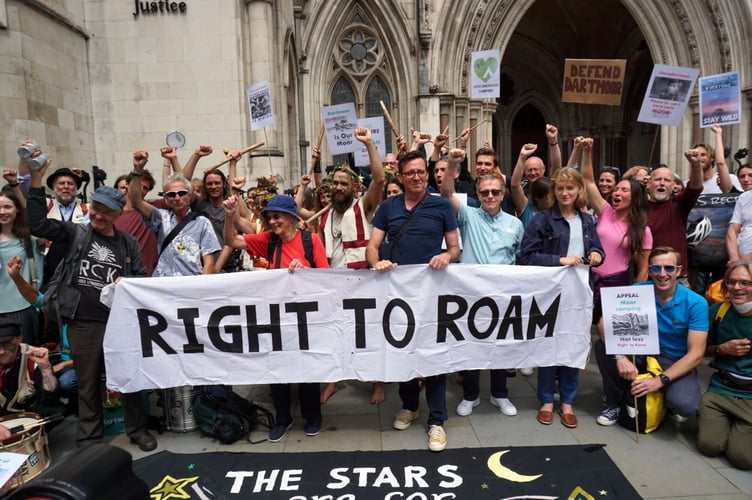AS Dartmoor National Park Authority (DNPA) took their appeal over the legal right to wild camp to the Royal Courts of Justice, over a hundred people took to the streets of London outside the courts to show their support.
The appeal follows a legal battle between the Park Authority and landowner Alexander Darwall last winter, in which Darwall successfully convinced the court that the legal right to camp on the moor never actually existed, despite it being commonly believed that the right had been enshrined in Dartmoor’s byelaws since 1985.
Cat Howard, one of the rally’s organisers from Kingsteignton, said: ‘It’s been really positive. Lots of connections were made with people all over the country that really care about the right to roam and our rights being eroded from Dartmoor.

‘I work with a lot of local young people, I do a lot of work with Ten Tors and DofE. It’s really important that young people are able to have these experiences. Taking the right to camp away could profoundly affect future generations.’
The sudden ending of this decades-old assumed right triggered public outcry across Devon and beyond, prompting a thousands-strong rally on Stall Moor – Darwall’s land, last January.
More than £60,000 has since been raised by the Dartmoor Preservation Association, helping to cover the legal costs of the appeal.
What the appeal is hinging upon, as indeed was the original case, is what is meant in the byelaws by recreation. Darwall’s legal team argue that camping is not recreation and is therefore not included in the ‘right of access to the commons for the purpose of open-air recreation’ in the byelaws.

They also argue that the right to camp interferes with landowners’ property rights. DNPA lawyers assert that recreation ‘undoubtedly includes camping’ and that if it was ruled otherwise, almost every other activity on the moor would also not count as recreation. Lawyers also argue that the original verdict had not considered the ‘wider public interest.’
The appeal has been adjourned, with a verdict expected later this month.
Lewis Winks, speaking for Right to Roam, said: ‘It’s been amazing, there’s been a huge turnout of people here today. The reason for that is people are starting to join the dots and see that this is the latest in a long history of clearing land, enclosing the commons and losing rights.’
Since the ruling, a new permissive agreement has been set up, in which landowners continue to allow camping on their land in exchange for a fee, paid for by the DNPA.
Campaigners argue that taxpayers should not have to foot the bill for what they believe to be a legal right. They also argue that it puts camping in jeopardy for future generations.

Dan Davy, from South Brent, said: ‘I’ve been working with the campaign from the beginning. The reason why I do is because my dad has worked in the Dartmoor Rescue Group, I’ve spent my whole life wild camping on Dartmoor.
'To me, it was an integral part of growing up, who I am as a person. The idea that someone else could lose that because of some rich landowner, is appalling.’

Lewis Winks added: ‘As a father, I wonder whether my daughter will have that permission granted to her and her children. What will this agreement will look like in 50 years’ time? We need far-reaching legislation that goes beyond Dartmoor and to the rest of England which allows access to all our wild areas.’

Becky Richardson grew up in Devon, but now lives in Wiltshire. Becky said: ‘Dartmoor was my garden as a child. I spent an awful lot of time on Dartmoor, it’s a place that I’d take my children to and now they’re adults, they now go to.
'I think it’s so important that it remains accessible to everybody, and the reason why they’re trying to erode camping rights are not for the good of the greater public. It’s not preserving Dartmoor, I think that the people that camp on Dartmoor have a much better idea of how to preserve Dartmoor because they love it. He (Darwall) just wants to make money from it.
'The reasons are all wrong, and I think it’s the start of a bigger conversation about access to land across England. But for me it very much started on Dartmoor.'

Poppy Price-Dowhan is a wheelchair user from Suffolk.
Poppy said: 'Wild camping as a disabled person is very challenging, if you want to camp on the edge of legality as an able-bodied person, you can go and hide somewhere. If you’re a wheelchair user, you’re visibly more vulnerable. Being somewhere like Dartmoor, where it’s accessible and okay, is so important to have.
'People with disabilities want to get out more, but if they don’t have the spaces to do it, it becomes impossible. It’s a part of access that people don’t think too much.'




